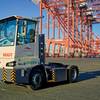Scandlines' Highest Passenger Transport Record
Scandlines focused the business on the Germany-Denmark routes and made significant investments in future-proofing the group’s ferry operations as well as catering and retail activities in 2015. Efforts to promote the Rostock-Gedser route paid off for Scandlines having recorded the highest number of transported passengers in five years and posted strong financial results.
Revenue grew by 3.5% to EUR 460 million in 2015 (2014: EUR 445 million) as Scandlines recorded its highest number of transported passengers in five years. The ferries transported 7.6 million passengers, 1.8 million cars and 0.5 million freight units in 2015. Progress was driven by particularly strong performance on the Rostock-Gedser route, which saw a 9.6% increase in transported cars and passenger growth of 6.3% during the year. The Puttgarden-Rødby route experienced a slight decline of 0.1% in transported cars and a modest passenger growth of 2.2% as the route faced operational challenges in 2015 when capacity was reduced by 25% in the high season following damage sustained to a ferry during a planned yard stay. Freight volume increased by 6.2% overall, and Scandlines’ catering and retail sales including BorderShop activities continued the strong performance driven by significant investments in recent years.
Scandlines improved the result from ordinary activities (recurring EBITDA) by 6.3% to EUR 170 million (2014: EUR 160 million), corresponding to a recurring EBITDA margin of 37% (2014: 36%). The positive development was mainly attributable to traffic growth on the Rostock-Gedser route, cost reductions and operational optimisation.
“We continued the positive trend in 2015 and met our expectations for the year as the efforts to strengthen the Rostock-Gedser route showed good results and confirmed the prospects of establishing the route as an efficient, reliable and competitive corridor through Central and Eastern Europe. Despite challenges finalising our two new hybrid ferries for the Rostock-Gedser route and operating the Puttgarden-Rødby route at 25% capacity reduction for several months, we grew both revenue and profit during the year and transported the highest number of passengers in five years,” says CEO Søren Poulsgaard Jensen.
Scandlines continued to build a more focused and competitive business in 2015 with the divestment of the Helsingborg-Helsingør ferry route in January. The group’s administrative structure was streamlined with the German head office moved from Warnemünde to Hamburg and the consolidation of operational functions in the ports of Rostock and Puttgarden. Simultaneously, Scandlines invested EUR 136 million (2014: EUR 122 million) in completion of two new hybrid ferries by Danish shipyard FAYARD expected to be operational on the Rostock-Gedser route in 2016 as well as IT operations and sales and marketing initiatives. The customer-centered loyalty program, SMILE, continued to gain traction following its launch in 2014, and the number of members more than doubled to exceed 200,000.
During 2015, Scandlines pursued the long-term ambition of providing emission free ferry operations on the Puttgarden-Rødby route, and progress was made as the group’s hybrid propulsion system was combined with closed loop scrubbers, enabling Scandlines to comply with the new sulphur regulation, which came into effect on 1 January 2015.
“We have focused our business solely on the Germany-Denmark routes combined with a strong catering and retail offering, and we have invested heavily in this sustainable and long-term business model while simultaneously reducing debt to strengthen our competitiveness further. This is testament to the fact that we are confident that our strategy of expanding the route Rostock-Gedser route and continuing operations on Puttgarden-Rødby will generate strong results irrespective of whether a fixed Fehmarn link might be completed someday or not,” says CEO Søren Poulsgaard Jensen.
Scandlines expects a minor overall decline in financial performance in 2016 as a consequence of considerable charter costs for the two new vessels to be commissioned on the Rostock-Gedser route.













